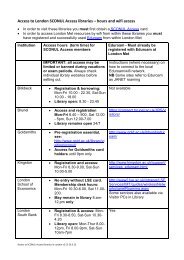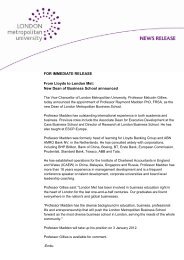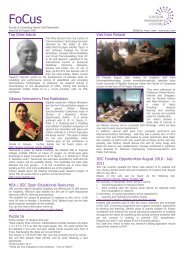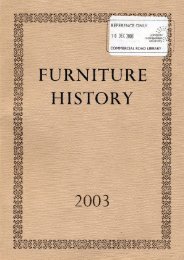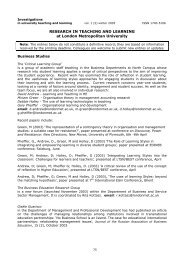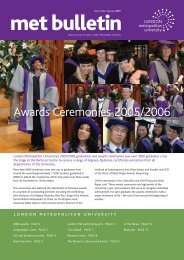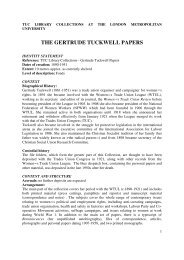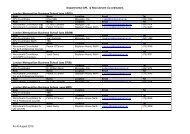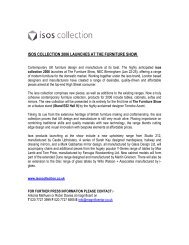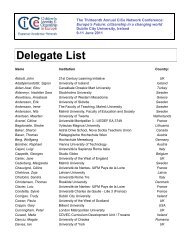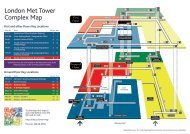prente-n - London Metropolitan University
prente-n - London Metropolitan University
prente-n - London Metropolitan University
Create successful ePaper yourself
Turn your PDF publications into a flip-book with our unique Google optimized e-Paper software.
28<br />
Students’ learning is organised according to the individual programme of study and includes various<br />
activities:<br />
Work-based learning using self-study and/or communication and collaboration with other<br />
professionals at work. The students will be expected to work in their normal business<br />
environment to prepare the course tasks materials to be submitted for formal assessment and<br />
presentation at the university.<br />
E-Learning using electronic communications with the tutors for guidance and support. Part of the<br />
study will be conducted using materials, provided by the university and made available to the<br />
students over the Internet using convenient tools (e-mailing, instant messaging, file<br />
downloading). Supplementary learning material such as notes and handouts, bibliography and<br />
links to external resources will be generally available through the university WebLearn system.<br />
Individual and Group sessions for oral presentation of research reports, professional portfolios<br />
and for practical demonstrations of engineering solutions. This will be organised on university<br />
premises with participation of both the students and their tutors.<br />
Recognising of prior experience, academic study and professional training. The students will be<br />
allowed to claim up to 50% of their study credits according to the university procedures for<br />
recognising prior experience after standard AP(E)L procedures.<br />
Individual or group guidance for AP(E)L applications. As part of the procedures for credit<br />
recognition the students will be provided with the necessary instructions and practical assistance<br />
to allow them optimize their programme of study according to their personal experience.<br />
Part of the study program can also include attendance of taught modules and short intensive<br />
courses available through the Faculty of Computing current portfolio of modules. In such a case<br />
the direct contact time will increase, combining lectures, workshops, tutorials and seminars in<br />
which information is conveyed through various more conventional methods such as group-work,<br />
case studies, problem based learning tasks, presentations and demonstrations.<br />
Assessment<br />
Students should expect to be assessed through a variety of methods strictly related to the course<br />
outcomes listed above.<br />
Formative assessment such as written coursework, research reports and professional portfolio will<br />
require students to<br />
Conduct individual research<br />
Formulate business cases<br />
Collect factual data<br />
Build problem portfolios<br />
Propose business models<br />
Perform feasibility analysis<br />
Construct technical specifications<br />
Develop software prototypes<br />
Evaluate technical solutions from business, professional, legal and social perspectives<br />
Write technical documentation<br />
Summative assessments such as prototype demonstrations, oral presentations and project reports<br />
will add to the above outcomes a variety of tasks, including:<br />
Discussing advantages and disadvantages of alternative solutions available<br />
Comparing alternatives according to a designated set of criteria<br />
Planning project activities for achieving professional targets<br />
Specifying technical solutions using pseudo-code, formal languages and visual diagrams



